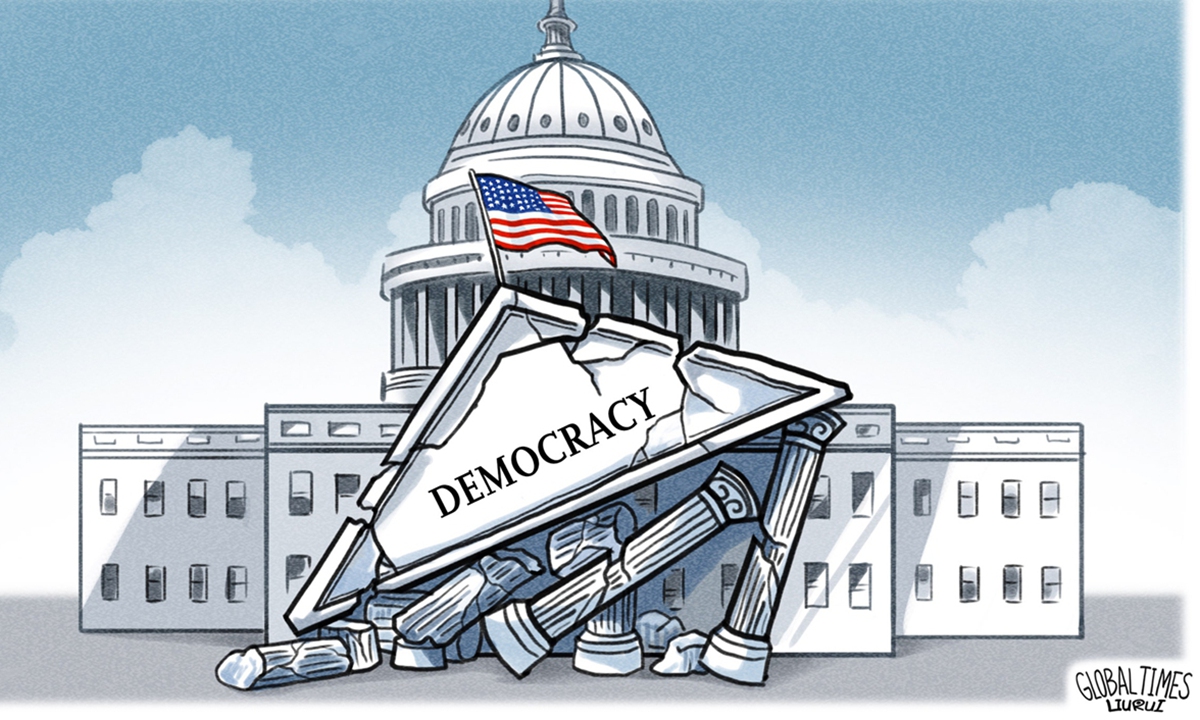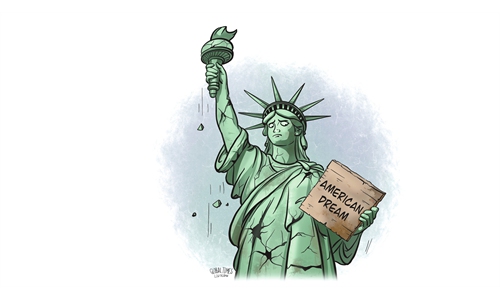
Illustration: Liu Rui/GT
The US is confronting a political system facing a crisis of legitimacy. A major component of the crisis is structural and inherent to US governance. Politicians in the US do not succeed in politics because of their service to the people. They are first selected by a tiny fraction of society wielding immense wealth and power before they are presented to voters.
Nowhere is the gap between the policies that US politicians pursue and the well-being of the people bigger than foreign policy. A cursory look at the economic approach to China under the administrations of former president Donald Trump and current President Joe Biden demonstrates this clearly. Under the Trump administration, the US imposed tariffs on Chinese exports and sanctions on China's tech sector. Under the Biden administration, the US increased these tariffs to include the Chinese electric vehicle sector, expanded "black list" of Chinese tech corporations and targeted the semiconductor industry as a flashpoint in arresting China's high-tech development. The two US administrations' continuity on US foreign policy toward China extends into their military posture as both administrations saw greatly intensified US militarization in the Asia Pacific presence along China's border and dangerous escalations over Taiwan in violation of the one-China principle.
Nothing about US foreign policy, whether it targets China or another nation, benefits the American people. Trillions of US dollars have gone unaccounted for, while many Americans struggle with debt, increasing rates of poverty, lowering life expectancy, inflation and stagnant wages. This has led to a crisis of political legitimacy where support for Congress and the president are at an all-time low while support for third-party alternatives to the two-party system is at a high point. The question is, then, why do US politicians fail to serve the interests of their constituents? What makes them choose to enrich military contractors and monopoly financial institutions while neglecting the ordinary worker?
The US is not a democracy. It's a plutocracy of private capital. One percent of the US population owns more than one-third of US wealth. But more importantly, this one percent comprises the property owners of the biggest monopolies and financial institutions in the US and have designed a political system where their patronage directly corresponds to US policy. While politicians may promise ordinary Americans that their policies will benefit them. However, once elected these same politicians pursue an agenda which enriches the wealthiest corporations at the expense of the well-being of the people. In 2014, two US scholars conducted a study on the impact that various interest groups hold on government policy. They found that big business and interest groups made a huge impact on US policy and average citizens made little to no impact at all. Their findings find no shortage of validation. While the vast majority of people face economic and social strife, US politicians are busy sending more military aid to Ukraine and Israel and holding fundraisers with the richest in the corporate and finance sectors. This has given way to political malaise in some respects, but it has also encouraged more people to seek alternative political avenues to the two-party system.
As the gap between US policy and the interests of humanity reaches an all-time high, US politicians will continue to compete among themselves over how to best manage a growing crisis of legitimacy. An ever-increasing number of Americans will grow disdainful of this process. This means that an even more polarized political environment is coming to the United States as people navigate gross power distortions between the average American and the elites. Meanwhile, they continue to look for ways to fulfill their desire for a more people-driven and people-centered political agenda.
The author is an independent journalist in the US and co-editor of Friends of Socialist China. opinion@globaltimes.com.cn

